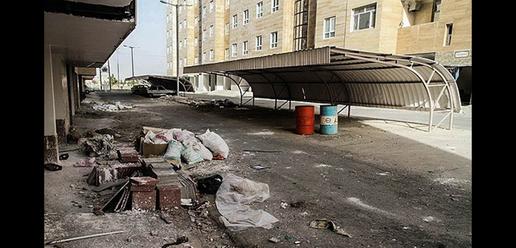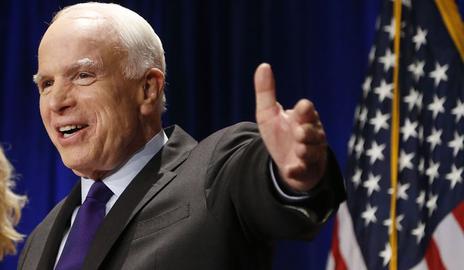On Monday, December 5, bus stations across Tehran were packed with waiting passengers. They watched as lines of buses moved at just over 15 miles per hour, their headlights turned on to show their solidarity — and their anger.
The drivers, all employees for Tehran Bus Company (TBC), were protesting against the violence so many of them had endured the day before, when they had gathered outside government offices in Tehran to voice their discontent.
“After Sunday ended in violence and our colleagues were beaten brutally, we decided to protest this way instead,” one driver told IranWire.
Monday’s protest started at 10 am, but it soon came to a stop after Tehran Municipality, which runs the bus company as a monopoly, issued threats and intimidated protesters. “The news spread that TBC Security sent its own inspection cars and was taking photographs and videos of protesting drivers,” the driver said. “We were threatened as well. At the bus terminals, they told us: ‘If you drive with your lights on, you will not have a job tomorrow.”
But the bus company employees are determined to continue their protest in whatever way they can. Their demands? A satisfactory explanation from TBC about the homes they were promised five years ago. At the time, many drivers enthusiastically scraped together the required funds to make the promise a reality, but nothing ever happened. “We did not get our homes,” the TLC driver told me. “Now when we want to talk about it they beat us up. When we protest they threaten to fire us. But we must get what is our due.”
The Broken Promise
I asked a member of the board for TBC’s employees union what happened to the promised housing. “In 2011 the TBC’s Housing Co-operative announced that drivers who did not own a home could register to get one,” he said. “It also designated the necessary land so that, under the Mehr Housing Project, the drivers would get their own homes.”
The Mehr Housing Project, which was set up to provide affordable housing for low-income families and workers on government-owned land, has become synonymous with the corruption and mismanagement of former President Mahmoud Ahmadinejad’s administration. At the time of the scheme’s launch, Iran was undergoing a property boom, with real estate prices dramatically inflated. To pay for the housing, the government instructed Iran’s Central Bank to print money, resulting in extremely high inflation. To make matters worse, the housing units that were actually constructed did not fit the original building brief and lacked basic amenities, including electricity and water.
To register for a home, a bus driver was required to pay one million tomans (around $960 at 2011 exchange rates) as a down payment; TBC’s management promised to help them with the rest. “They said that for each year of service, the driver would get one million tomans as a subsidy towards buying the home,” the driver I spoke to said. “Meaning that a driver who had given 15 years of service was to receive 15 million tomans and a driver with five years of service would get five million. Then they sold the repair shop opposite TBC’s headquarters and said the proceeds would be used to help with the construction of the housing.” He said that, on average, each driver would get around five million toman. “But in the end, very few of them got the five million.”
“Give us More Money”
The chosen location for the housing project was Pardis in Karaj near Tehran. Drivers paid the housing co-operative between 50 and 60 million tomans, and the project got underway in 2011. All seemed to be going well at first, but then, in 2012, the contractor announced it had not received enough money to complete the project. The housing co-op claimed that it had paid out all the money that had been contractually agreed on for that stage, and that the rest would be paid upon completion. The contractor stopped construction, and the co-operative sued the contractors.
The case against the contractor was extremely complicated, and the lawsuit dragged on for three years, marred by corruption at the court itself. “Each time the court ruled in the workers’ favor, the contractors appealed,” said IranWire's source. “And since the company had influence with the prosecution, the appeals court overturned the ruling.”
But these rulings — and the way they came about — met with protest. “It seems that the Karaj prosecution and court have come under intense pressure to decide in favor of the workers,” my source said. “They took the project away from the contractor and gave it to the housing co-op, and it was decided that contractor must pay for the damages. Even the deed to the land, which was in the name of the contractor, was transferred to the co-op.”
When these details emerged, the drivers decided to take matters into their own hands. When they gathered outside Tehran Municipality on December 4, they were told that the project was still facing “legal issues” and that, following the court’s verdict in 2015, they would now have to deal with the housing co-op directly. “Mr. Keshavarzian, the president of the co-operative’s board of directors, had announced on the day of the court ruling that he would have the residential units ready in a year, but he reneged on his promise and did not deliver,” said the driver I interviewed.
Over the last two weeks, the board of the drivers’ union has met several times with the board of the housing co-operative, but nothing has been resolved. “The housing co-op now repeats the same things that the contractor was saying. They say that the workers must pay them more money so they can start work. They say either sell these units or wait for the commercial [non-subsidized] units to be sold. But what sane person is going to buy the commercial units that have the facilities and services of a desert? We saw we were not getting anywhere and decided to find another way.”
Tell it to the Mayor
The drivers’ union polled its members. After they rejected the solutions proposed by the housing co-operative, they decided to appeal to Tehran’s municipal government. “Each time we talked to the management for the co-operative, they told us to go to the municipality because it is [Tehran’s mayor] Mr. Ghalibaf who makes all decisions. He can allocate the funds necessary to finish the project.”
Protest organizers galvanized support using the mobile app Telegram. The plan was to gather with their families and colleagues at 10am.
But when they tried to get to the appointed place, they were met with a blockade. Security forces and anti-riot police had closed off all streets leading to the municipal buildings, not only barring drivers, all of them dressed in uniform, from entering the area, but also from gathering in a nearby park. Any group numbering more than three people were forced to disperse. Drivers, outraged, shouted out their frustration. According to one eyewitness, a colonel by the name of Jafari ordered his troops to beat the protesters. “He shouted: ‘hit them below the belt. Hit them even if you break their legs. Hit them and don’t let them gather together.’ This angered the drivers and they started chanting, ‘God, uproot the injustice!’”
The crowd grew larger and the protesting workers rushed into the streets nearby the blocked-off area. Twenty drivers were arrested. Three drivers suffered head and neck injuries and were taken to the hospital. Upon their release, most of them rejoined the protest.
....or Tell it to the Supreme Leader
After a few hours, the arrested drivers were released. “Protesters had shouted out that they would continue the rally until their colleagues were released,” said one of the arrested drivers. “I think this was why they released us without forcing us to sign a pledge. They just said, ‘you are disrupting public order, and punishment is a year in prison — but we don’t want to prosecute you.’ They also suggested a way to get results. They said that instead of protesting, we should write a letter to the office of the supreme leader. He can order Ghalibaf to solve it.”
Whether this advice is sound remains to be seen. But the drivers remain adamant. What else can they do? They are determined to make sure their voices are heard until some sort of compensation is paid out.
“Today, many drivers protested by turning on their lights and driving slowly,” my interviewee said. “If the problem is not solved, we will continue to protest. We have said we are prepared to strike. We ended the rally chanting: ‘Ghalibaf, Ghalibaf, Strike, Strike!’”
visit the accountability section
In this section of Iran Wire, you can contact the officials and launch your campaign for various problems

























comments